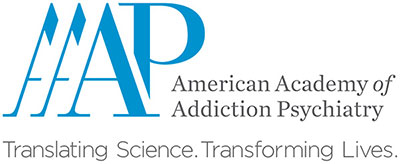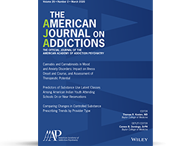AAAP offers many committees and special interest groups for members to get involved with. For more information about joining a committee or special interest group email Nicolas at [email protected].
Committees
Carla Marienfeld, MD, Chair; and Subhadeep Barman, MD, Co-chair
AAAP thinks that the continuing professional development (CPD) of our healthcare providers is extremely important. The CPD committee was formed because of the growing need for members to have access to educational resources that will be clinically useful to the field and to increase the likelihood that practitioners actually implement these treatments in their own practices and programs. This committee reviews what treatments work, how do we know they work and how can we put them into practice. View Disclosures of our CPD Committee.
David Marcovitz, MD, Chair; and Dhruti Patel, MD, Co-chair
The Early Career Committee aims to offer mentoring and resources to Residents, Fellows and early career Attendings. This committee serves as a resource for providing guidance towards additional clinical training, research or career opportunities. It offers support for the transition from training to administrative and clinical leadership roles in a variety of practice settings.
Alexis Ritvo, MD, MPH, Chair; and Alena Balasanova, MD, Co-chair
The primary role of the Education Committee is to support high quality training for PGY I-V Addiction Psychiatry residents, promote the quality of teaching and clinical experience in the addictions in general psychiatry residency programs, and encourage medical students interested in the field of Addiction Psychiatry.
Laurence Westreich, MD, Chair; and Debra Barnett, MD, Co-chair
The Law and Addiction Committee focuses on education and practice at the interface between addiction and the legal system. Some relevant issues include Drug Courts, the clinical treatment of addicted and dually diagnosed persons in the Justice System, employment law, child custody disputes, and Impaired Professional Assessments. The committee addresses educational gaps in the field, promotes collaboration between professionals and supports legislation and rules protective of the rights of people with addiction. The committee will also work in collaboration with the Public Policy committee.
One major initiative of the Law and Addiction Committee is the development of educational materials for the justice system on the medical aspects of substance use disorders, opioids, and co-occurring psychiatric disorders. Learn more about this initiative here.
Danae DiRocco, MD, Chair; and Chun Tong, MD, Co-chair
The Membership Committee strives to anticipate, ascertain and address the needs and wishes of its membership. The Membership Committee asserts that members are the organization’s most important asset and through constant dialogue, works to continue to improve member benefits and experience. The Membership Committee welcomes members at all levels of their career who would like to become involved.
Justine Welsh, MD, Chair; James Berry, DO, Co-chair; and Daryl Shorter, MD, Co-chair
The Public Policy Committee assists with the generation, coordination and dissemination of AAAP policy recommendations regarding addictive disorders to the general public. The Public Policy Section works in close collaboration with the Research, Treatment and Education Sections of AAAP to promote excellence of clinical practice in Addiction Psychiatry, to educate the public regarding substance use disorders, to promote accessibility and quality of treatment for all patients, and to support research in the field. Further, the Public Policy Section supports the Board of Directors in their deliberations regarding AAAP positions on legal cases and legislative initiatives pertinent to substance use disorders and addiction psychiatry.
Lewei (Allison) Lin, MD, MSc, Chair; and Joao De Aquino, MD, Co-chair
The Research Section examines how recent research advances inform the contemporary practice of Addiction Psychiatry. A particular interest is determining how scientific discoveries are translated into real-world clinical practice by AAAP members and how best to ensure that the most relevant research findings are transmitted to the membership in a timely fashion to promote life-long learning.
Elie Aoun, MD, Chair; Caridad Ponce-Martinez, MD, Co-chair; and Louis Trevisan, MD, Co-chair
AAAP’s Scientific Program Committee (SPC) reviews and selects all scientific content and plans the AAAP Annual Meeting. The SPC is an active and integral component of AAAP; each committee member significantly contributes to the quality and planning of the Annual Meeting and Scientific Symposium by reviewing and selecting submissions for symposia, papers, posters, concurrent workshop sessions, and other meeting programming. Disclosure information for each committee member is collected annually and is managed and/or resolved accordingly.
Jennifer Creedon, MD, Chair
The Child and Youth Treatment Committee seeks to identify and address issues unique to our youngest patients. The committee promotes the visibility of addiction treatment of minors by presenting symposia and workshops about child and adolescent substance abuse and distributing educational materials to a broader audience.
Special Interest Groups
Chair, TBD
The cannabis special interest group aims to inform both treatment of cannabis addiction and cannabis-related policies from an evidence-based perspective. Members share our clinical experiences treating cannabis addiction as well as the challenges and concerns we have about the changing landscape of marijuana cannabis policy as state after state faces questions about medical cannabis and legalization of cannabis.
Zev Schuman-Olivier, MD, Chair
To contribute to development of best practices for evaluating and implementing integrative medicine approaches with an evidence-based medicine approach to care and raise awareness about the evidence of robust levels of interest in evidence-based, integrative and complementary approaches to addiction treatment (e.g., mindfulness, meditation, acupuncture, yoga, nutritionals, herbal and natural medicines, etc.).
Greg Bunt MD, Chair; and Carol Weiss, MD, Co-chair
There are a wide variety of approaches to the treatment of, and research in, addictive disorders, around the globe. Differences in approach to issues such as opioid use disorder, harm reduction, alternatives to incarceration, and process addictions are especially notable.
The International Addiction Topics special interest group will provide a forum for AAAP members to learn more about International topics, and provide a mechanism to develop their greater involvement. For example, the special interest group could submit proposals to the AAAP Annual Meeting, as well as international addiction organizations such as ISAM (International Society for Addiction Medicine). The group could collaborate with AAAP International Area IX on presentations and proposals.
John Fromson, MD, Chair; and Jonathan Lee, MD, Co-chair
The Physician Health committee serves as an educational and policy planning resource for clinical, administrative and research issues related to the identification and treatment of physicians with psychoactive substance use or other psychiatric disorders as well as factors relating to the prevention of such illnesses.
Derek Blevins, MD, Chair; and Faye Chao, MD, Co-chair
The Gender and Sexuality Special Interest Group supports educational programming at the intersection of addiction psychiatry, gender, and sexuality. The group advocates for policies that support equality in a world with broad gender and sexual diversity and fosters social and professional community-building. AAAP members who may identify as LGTBQ+ and/or any other identity along the gender identity, gender expression, sexuality, and sex developmental spectra are welcome to join. This Special Interest Group supports AAAP’s partnership with the many health associations that address sexual and gender diversity.
Maher A. Karam Hage, MD, Chair
To identify efforts to improve providing tobacco and nicotine treatment and provide education to improve understanding of the evidence around treatment, harm reduction approaches, and risk of relapse to psychiatric disorders, in particularly substance use disorders by continuing to smoke cigarettes/use tobacco products.
Marc Galanter, MD, Chair
Twelve Step approaches are widely applied as adjuncts to professional treatment. This Special Interest Group’s mission is to promote clinical education, treatment referral, and research on Alcoholics Anonymous and Narcotics Anonymous. This is particularly timely since a recent metanalysis has demonstrated efficacy for AA as an adjunct to professional treatment. Our objective is to advance these issues in related addiction societies’ activities, and to promote appropriate use by physicians in practice.
Inbal Gafni, MD, Co-chair; and Ellen Edens, MD, Co-chair
The purpose of the group is to provide a forum for networking and mentoring for women in the field of addiction psychiatry. The group will also serve as an educational and policy planning resource for addiction related issues specific to women. The group welcomes and encourages women in all stages of their career, as well as from various cultural and ethnic backgrounds, and from different geographical regions, to join. Trainees are also encouraged to join.
Jennifer Creedon, MD, Chair
The Child and Youth Treatment Committee seeks to identify and address issues unique to our youngest patients. The committee promotes the visibility of addiction treatment of minors by presenting symposia and workshops about child and adolescent substance abuse and distributing educational materials to a broader audience.



